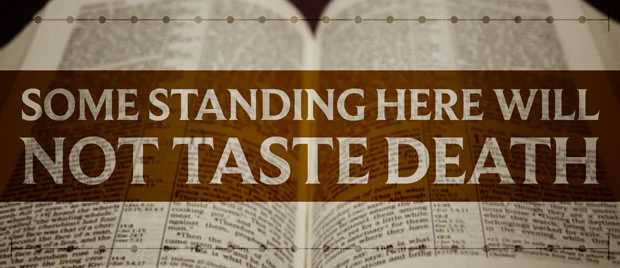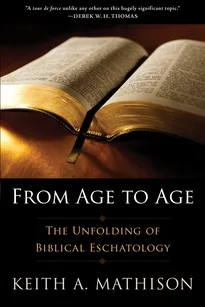Some Standing Here Will Not Taste Death

From the point of Peter’s confession onward, Jesus begins to teach his disciples that he must go to Jerusalem, suffer, be killed, and on the third day, be raised (Matt. 16:21). Peter rebukes Jesus for saying this, but Jesus shows him that this is the only way (vv. 22–23). Jesus tells his disciples that they must take up their cross and follow him because it is foolish to gain the world and lose one’s soul (vv. 24–26). Then Jesus says:
For the Son of Man is going to come with his angels in the glory of his Father, and then he will repay each person according to what he has done. Truly, I say to you, there are some standing here who will not taste death until they see the Son of Man coming in his kingdom (Matt. 16:27–28).
Like Matthew 10:23, this text has also been the source of much debate. Davies and Allison survey some eight different interpretations that have been proposed.1 Among the more prominent interpretations is the idea that “coming of the Son of Man” in view here is the transfiguration, which is narrated in the following chapter.2 Some suggest that Jesus is referring to his resurrection or to Pentecost. Others suggest that Jesus is referring to the destruction of Jerusalem in AD 70.3 Then there are those who believe Jesus is speaking here of his Second Coming and of the end of history. Among those holding this view, there are those who believe Jesus was mistaken because he believed this would occur within the lifetime of his hearers, and there are those who believe that Jesus was correct because the “some standing here” refers to a later generation.4
In order to come to an understanding of this saying, we must again be reminded that when Jesus speaks of the “coming of the Son of Man,” he is purposefully alluding to Daniel 7:13–14. And again we must recall that the coming of the Son of Man in Daniel 7 is set within a judgment scene before the throne of God (cf. Dan. 7:9–10). Unlike the saying in Matthew 10:23, the saying in 16:28 is found in the immediate context of words regarding judgment (v. 27). The point that Jesus is making when he says that there are some standing here who will not die before they see the Son of Man coming in his kingdom is that there are some to whom he is speaking who will not die before the prophecy of Daniel 7 is fulfilled, in other words, before Jesus receives the kingdom from his Father.
A comparison of Matthew 16:28 with its parallels in Mark 9:1 and Luke 9:27 lends support to this interpretation. All three sayings are set within the same context immediately before the Transfiguration, yet whereas Matthew speaks of some living long enough to see the coming of the Son of Man, Mark and Luke speak of some living long enough to see the coming of the kingdom of God. The “coming of the Son of Man” then is simply another way of saying “the coming of the kingdom of God.” It is the assumption that the words “coming of the Son of Man” must mean “Second Coming” that has caused much of the confusion. Once we realize that Jesus is simply using a phrase from Daniel 7 to allude to the whole prophecy, texts such as Matthew 16:28 are much more readily understood. Jesus was not predicting that his Second Coming would occur within the lifetime of some of his hearers. He wasn’t speaking of the Second Coming at all.5 He was referring to the fulfillment of Daniel 7, his reception of the kingdom from the Father, and this was fulfilled within the lifetime of some of his hearers (cf. Matt. 28:18).6
As noted above, Matthew 16:28, unlike Matthew 10:23, is set within the context of a discussion of judgment. Verse 27 speaks of the Son of Man coming with angels and judging man. If the coming of the Son of Man in verse 28 is an allusion to Daniel’s prophecy of one like a Son of Man coming up to the Ancient of Days, is the coming of the Son of Man in verse 27 a different “coming”? If it is the same “coming,” then what is the judgment spoken of in verse 27? There are two possibilities. Since Jesus’ receiving of the kingdom is part of an entire nexus of events that concludes only at the consummation and Second Coming, it could be that the judgment referred to in verse 27 is the final judgment. If so, Jesus speaks of the first and last events in the connected series as parts of a single whole but without mentioning the amount of time that might lapse between them. Another, more likely, possibility is that the judgment Jesus is referring to in verse 27 is the judgment referred to in Daniel 7:9–10, a heavenly judgment of the “beasts/nations” that is directly related to Jesus’ receiving of the kingdom of God from the Father, an event that occurs in connection with his first advent.7
This article is part of the The Unfolding of Biblical Eschatology collection.
-
W.D. Davies and D.C. Allison, Matthew 8–18 (London: T&T Clark, 1991), 677–9. ↩
-
See Craig L. Blomberg, Matthew (Nashville: Broadman, 1992), 261. ↩
-
See Donald A. Hagner, “Matthew’s Eschatology,” in To Tell the Mystery, JSNTSup 100, ed. Thomas E. Schmidt and Moises Silva (Sheffield: Sheffield Academic, 1994), 62. ↩
-
There are also some who believe that Jesus correctly predicted that his Second Coming would occur within the lifetime of some of those who were listening to him speak. They argue that the Second Coming of Jesus and all the events associated with it occurred already in the first century. For a critique of this interpretation, see Keith A. Mathison, ed, When Shall These Things Be? (Phillipsburg: P&R, 2004). ↩
-
Some might ask whether this interpretation requires us to believe that nothing is said in the New Testament about the Second Coming of Christ. I do not believe this to be true. Jesus himself may have said very little about the Second Coming, but it must be remembered that his disciples were barely able to grasp the idea that he would be leaving them. It makes sense that the bulk of the New Testament’s teaching on the Second Coming would be found after the resurrection and ascension (e.g., Acts 1:9–11; 1 Cor. 15:23; 1 Thess. 4:16–17; Heb. 9:28). ↩
-
In our discussion of the “already/not yet” nature of the Kingdom of God, we observed that the incarnation, crucifixion, resurrection, ascension, second coming, and final judgment are all distinct events, but events that are part of a single whole – the coming of the kingdom. Some of these events are associated with the kingdom’s inauguration, some with its consummation. What I am arguing here does not contradict this previous assertion. I am arguing here that when Jesus speaks of the “coming of the Son of Man” he is referring specifically to the events at the beginning of the series, those associated with the inauguration of the kingdom, not to events at the end of the series that are associated with its consummation. The events associated with the inauguration and with the consummation of the kingdom cannot ultimately be separated, but they are distinguished in the New Testament. It should also be observed that some of the events associated with the inauguration of the kingdom are seen as “first-fruits” of a larger whole that includes events associated with the consummation of the kingdom. The resurrection of Jesus, for example, is the “firstfruits” of a larger harvest that includes the general resurrection of the last day. The “coming of the Son of Man” is to the “Second Coming” what the inauguration of the kingdom is to the consummation of the kingdom, closely related but distinct concepts. ↩
-
Even if the judgment mentioned in Matthew 16:27 is the heavenly judgment of the beasts/nations found in Daniel 7, it is possible that there is a secondary reference to the final judgment since all of the events from the first advent to the second advent are part of a whole. The heavenly judgment of the beasts/nations at the first advent may be viewed as the “first fruits” of the eschatological judgment. ↩



